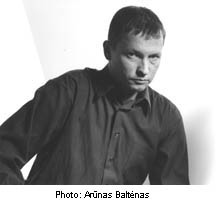'Does humor belong to music?' - Frank Zappa once asked with the title of one of his albums. The answer is below: 'If you have to ask you're too old to know...' The forty-year-old composer Gintaras Sodeika belongs to those artists whom one can never picture having reached an age when they are 'too old to know'...
The composer holds several important positions as the chairman of the Lithuanian Composers' Union, the president of the Agency of Lithuanian Copyright Protection Association, and the head of the electronic music studio at the Lithuanian Academy of Music. But all that does not at all restrict his independent creative attitude. In his work Gintaras Sodeika is a man who plays, homo ludens, who playfully comments on the laws of the surrounding world and art. In contemporary Lithuanian music Sodeika's work is distinguished by its paradoxical allusions, disguised or open irony and self-irony.
Sodeika belongs to the generation of the so-called 'machinists', who started their creative career in the mid-1980's. This generation attracted attention with their aesthetics of 'pure sound', investigating different possibilities of sound, employing unusual groupings of instruments and electronics, untraditional ways of sound producing, and the like. A certain asceticism, considerable reduction of musical material and somewhat mechanical minimalism (hence 'machinists') have also become trademarks of their work. It explains a peculiar paradox: in Sodeika's work fun and humour quite often go in hand with his typically cold and austere sound.
At the beginning of his career Sodeika's work was informed with unconventionality - happenings, sound installations, compositions of instrumental theatre. In the middle of the 1980's, the composer sound-designed the presentations of site specific works by the artistic group Žalias lapas. He was also the founder and curator of three festivals of happenings - AN-88, AN-89 and NI-90.
 |
The composer's conversion to theatre music in the early 1990's was quite natural. For more than 10 years, he has been working in collaboration with the famous theatre director Oskaras Koršunovas. Sodeika wrote music for nearly all of his theatre productions. A result of this collaboration is the unique role of music in drama performances: it significantly influences the dramatic action and shapes it, according to inherent laws of musical forms. A number of these productions had won prestigious awards at the Edinburgh Festival (1990, 1995), the Toruń International Theatre Festival (1991) and the St. Petersburg Theatre Festival (1993).
In 1998, Sodeika was granted the St. Christopher's award as the best theatre composer of the year for the music he wrote for Koršunovas' production of
Roberto Zucco by Bernard-Marie Koltès. Their latest joint work,
We Are Not Cookies after works by Daniil Kharms and Alexander Vvedensky, was staged at the Oslo National Theatre in April 2001. The premiere of
Parasites after Marius von Mayenburg's play with the music by Gintaras Sodeika is scheduled for the end of September 2001 at the Lithuanian National Drama Theatre. After the successful participation of Oskaras Koršunovas' Theatre in the international event
Hotel Europa, interest was received from Sweden about creating a production of movement without text,
Solitude for Two, based on the play by the Lithuanian playwright Sigitas Parulskis. The premiere of this performance is scheduled for January 2002 in Stockholm.
Another field of Sodeika's work, bordering on his theatre music, is 'conventional' chamber, vocal, choral and symphonic music. It is also noted for certain theatricality and associations with contemporary pop culture. The composer himself describes his works of recent years as 'academic techno' - a whimsical combination of traditional musical values with new technology.
Tone Ontology No.2 for two pianos - an intriguing stylization of techno music for traditional instruments in a traditional concert environment - enjoys particular popularity.
The concert trend of the composer's work further is represented by compositions connecting the elements of minimalism and jazz:
Tremors for chamber ensemble and
Force Majeure for two pianos and symphony orchestra. Sodeika's
Cicadas for piano four hands was performed this April in Washington, Cleveland, Chicago, and this July in Bodø (Norway). His new work
Alzheimer-Sonata for piano was premiered in June at the festival
Music of Friends in Moscow. The premiere of Sodeika's
Ecaudata commissioned for
Avanti! (Finland) is scheduled for this year's Gaida Festival.
© Lina Navickaitė & Linas Paulauskis
Lithuanian Music Link No. 3

